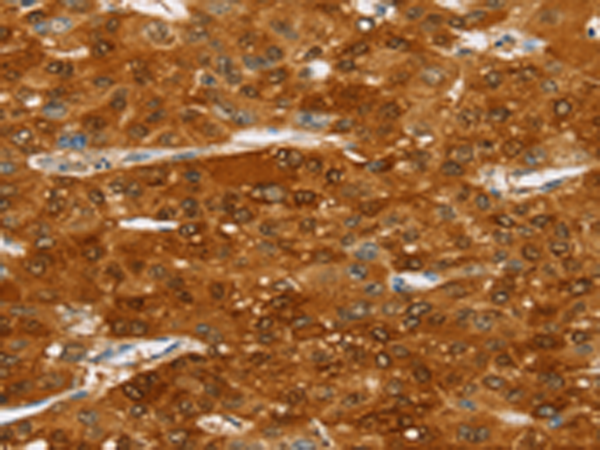

| WB | 1/500-1/2000 | Human,Mouse,Rat |
| IF | 咨询技术 | Human,Mouse,Rat |
| IHC | 1/25-1/100 | Human,Mouse,Rat |
| ICC | 技术咨询 | Human,Mouse,Rat |
| FCM | 咨询技术 | Human,Mouse,Rat |
| Elisa | 1/2000-1/5000 | Human,Mouse,Rat |
| Aliases | HST; ST2; STD; hSTa; DHEAS; ST2A1; ST2A3; DHEA-ST |
| WB Predicted band size | 34 kDa |
| Host/Isotype | Rabbit IgG |
| Antibody Type | Primary antibody |
| Storage | Store at 4°C short term. Aliquot and store at -20°C long term. Avoid freeze/thaw cycles. |
| Species Reactivity | Human |
| Immunogen | Fusion protein of human SULT2A1 |
| Formulation | Purified antibody in PBS with 0.05% sodium azide and 50% glycerol. |
+ +
以下是关于SULT2A1抗体的3篇参考文献的简要概括:
1. **文献名称**:*Characterization of a polyclonal antibody to human sulfotransferase 2A1 (SULT2A1)*
**作者**:J. L. Falany et al.
**摘要**:该研究开发并验证了一种针对人SULT2A1的多克隆抗体,证实其在Western blot和免疫组化中特异性识别SULT2A1蛋白,适用于检测肝和肾上腺组织中的酶表达水平。
2. **文献名称**:*Tissue distribution and hormonal regulation of sulfotransferase 2A1 (SULT2A1)*
**作者**:S. S. He et al.
**摘要**:通过抗体验证,发现SULT2A1在肝脏、肠黏膜和前列腺中高表达,其表达受雄激素调控,研究强调了该抗体在激素代谢研究中的应用价值。
3. **文献名称**:*Development of monoclonal antibodies to human sulfotransferase 2A1 for functional studies*
**作者**:M. Nishiyama et al.
**摘要**:研究报道了一种单克隆抗体的开发,该抗体能特异性抑制SULT2A1酶活性,为探究其底物特异性及药物相互作用提供了工具。
**Background of SULT2A1 Antibody**
The SULT2A1 (sulfotransferase family 2A member 1) antibody is a tool used to detect and study the expression of the SULT2A1 enzyme, a member of the cytosolic sulfotransferase family. SULT2A1 catalyzes the sulfonation of endogenous compounds (e.g., steroids, bile acids) and xenobiotics, facilitating their excretion and modulating biological activity. It is primarily expressed in the liver, adrenal glands, and gastrointestinal tract, playing a critical role in hormone regulation, detoxification, and drug metabolism.
SULT2A1 antibodies are widely employed in research to investigate enzyme localization, expression levels, and function in physiological and pathological contexts. They are validated for techniques such as Western blotting, immunohistochemistry (IHC), and immunofluorescence (IF). Specificity is a key consideration; high-quality antibodies should recognize SULT2A1 without cross-reacting with other sulfotransferases (e.g., SULT1A1). Researchers often use these antibodies to explore SULT2A1's role in diseases like hormone-dependent cancers, metabolic disorders, or drug resistance, where altered sulfonation pathways may contribute to pathogenesis.
Commercial SULT2A1 antibodies are typically raised against peptide sequences unique to the human SULT2A1 protein, though reactivity with orthologs (e.g., rodent SULT2A1) varies. Proper controls, including tissue lysates from SULT2A1-knockout models, are recommended to confirm antibody specificity.
×